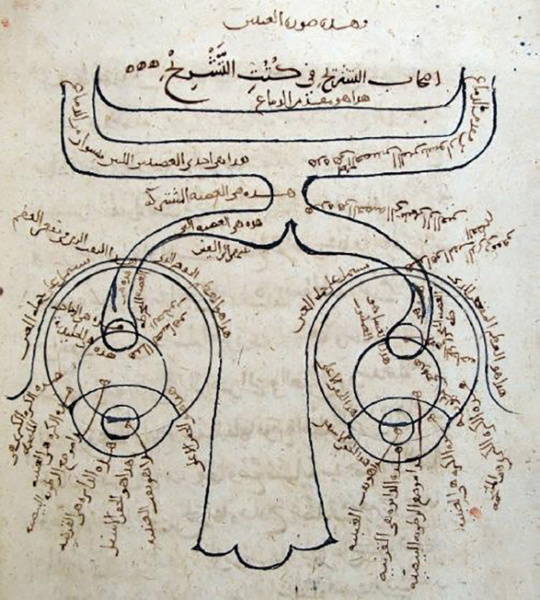The world shaking, paradigm shifting, Daily Show guesting ideas still most often come from individuals.
Division of labor fosters large enterprises for the instantiation of these ideas, but the ideas themselves, the Great Theories that make human kind worth having around, these, like the songs the whales sing, are the precious gifts of individual genius.

The structure of the human eye according to Ibn al-Haytham, Muslim Arab mathematician, astronomer, and physicist of the Islamic Golden Age, late 11th century CE. Referred to as “the father of modern optics”, he made significant contributions to the principles of optics and visual perception in particular. Note the depiction of the optic chiasm. —Manuscript copy of his Kitāb al-Manāẓir (MS Fatih 3212, vol. 1, fol. 81b, Süleymaniye Mosque Library, Istanbul)
Once upon a time, guys and gals read the sports pages for the drama of how their teams and their favorite sports warriors were doing. Batting averages, total yards gained, what Federer wore to Center Court at Wimbledon, these were the kinds of things that provided conversations among aficionados.
At some point that started to change.
Now, articles appear about contract disputes, trading strategies, salary caps, management turnover, until reading the sports pages is more like reading the Wall Street Journal and less like reading, well, the sports pages. People pay attention to the financial, organizational and political aspects of the sports world.
The science world is no different. Darwin sailed on a ship, retired to his country estate to think, and came up with the best idea anyone ever had. Einstein daydreamed in the patent office until his creative ideas transformed physics. But now, Craig Venter sequences DNA as a corporate venture. Universities are not just knowledge factories, but multinational knowledge conglomerates, and the road to permanent employment is “Patent or Perish”.
According to Google, The Scientist: Magazine of Life Sciences is a professional magazine intended for life scientists. Coverage includes reviews of widely noticed research papers, informing its audience of current research, updates to technology, updates to career information, profiles of scientists achieving notoriety, as well as other columns and reports of interest to its audience.
Financial, political and organizational reporting figure large in its monthly story cycle. Just like the sports pages! Here’s a sampling of articles of interest to neuroscientists: Potty Party: Researchers Show Young Cows Can Be Toilet-Trained, Brain Scans Predict Reading Skills, Happiness by Numbers, Slime Mold Smarty Pants, Years of Prozac Alter Lipids in Young Monkey’s Brains: Study, Mites Remember Enemies, Fight Back, Ketamine Encourages Nerve Remodeling, Talking Duck Stuns Animal Behavior Researcher, Can Magnesium Magnify Brain Power?, Einstein’s Unusual Brain, Brain Waves from the Beyond, An “Unconscious” Man Talks.
And here is a sampling from the science game: Labs, Leaks, and Liability, Less Influence for High-Impact Journals, Scientists Oppose NSF’s New Graduate Fellowship Priority, Science and the 2012 Election, Do Innocent Errors Cause Most Retractions?, AAAS: Don’t Label GM Foods, Save the NIH from Sequestration, Gender Bias when Hiring Scientists, Sexual Harassment Complaints in Academia Are Up Since 2018, The NSF Shake-Up, Predatory Publishing, DEA Moves Toward Approving More Research Marijuana Growers.
As Big Science goes corporate, there is something of the utmost importance to keep in mind.
The world shaking, paradigm shifting, Daily Show guesting ideas still most often come from individuals. Division of labor fosters large enterprises for the instantiation of these ideas, but the ideas themselves, the Great Theories that make human kind worth having around, these, like the songs the whales sing, are the precious gifts of individual genius.
Current issues of The Scientist are available free on the website.
*Updated & adapted from an original article by Natalie Geld for the Society for MindBrain Sciences.
